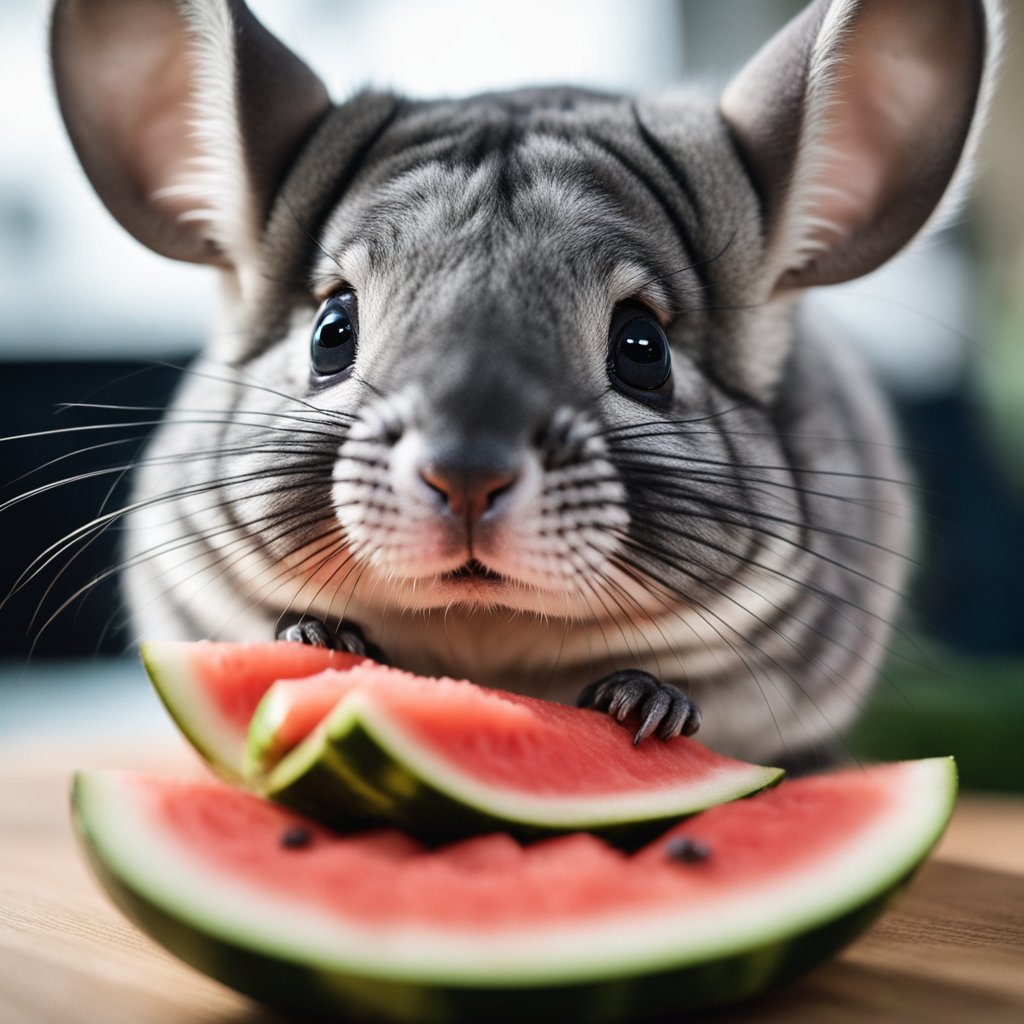Many chinchilla owners wonder if it’s safe to treat their pets with watermelon. Chinchillas can eat watermelon, but it should be given in moderation due to the fruit’s high sugar and water content. Understanding the best practices for feeding your chinchilla is essential for their health.

Fruits can be a fun treat, but not all are suitable for chinchillas. It’s important to ensure that your pet’s diet remains balanced and free from foods that can cause digestive issues. This article will explore the safety of watermelon for chinchillas, the effects of fruit on their diet, and why moderation is key.
Key Takeaways
- Chinchillas can enjoy watermelon, but limit their intake.
- A balanced diet is crucial for your chinchilla’s health.
- There are safer fruit alternatives to watermelon available.
Chinchilla Dietary Basics

Chinchillas have specific dietary needs that are crucial for their health. Their diet primarily consists of hay, pellets, and limited treats.
Key Components of a Chinchilla’s Diet:
- Hay: This should be the main part of your chinchilla’s diet. Timothy hay is preferred for its high fiber content.
- Pellets: Use high-quality chinchilla pellets to ensure they get essential vitamins and minerals.
- Fresh Water: Always provide fresh water. Hydration is vital for their digestion.
Foods to Avoid:
- Fruits and vegetables should be given only as occasional treats.
- Certain fruits, like bananas and watermelon, can cause digestive issues due to high sugar content.
Treat Guidelines:
- Treats should be low in sugar. Offer small portions—once or twice a week is best.
- Always monitor your chinchilla after introducing a new treat. Look for any signs of digestive trouble.
Focusing on a balanced diet helps maintain your chinchilla’s health and well-being.
Watermelon and Chinchillas

Watermelon may seem like a refreshing treat for your chinchilla, but it has important aspects to consider. Understanding the nutritional content and the potential hazards is crucial for your pet’s health.
Nutritional Content of Watermelon
Watermelon primarily consists of water, making it a hydrating fruit. However, it also contains natural sugars and some vitamins. The sugar content can be a concern for chinchillas since they are sensitive to high-sugar foods.
Here’s a breakdown of the key nutrients in watermelon:
- Water: About 90% of watermelon is water, which is not ideal for chinchillas.
- Sugar: Contains around 6-9 grams of sugar per 100 grams, which can lead to digestive issues.
- Vitamins: It has vitamin C and some B vitamins, but these aren’t essential for chinchillas.
These factors mean watermelon should be treated with caution when considering it as a treat for your pet.
Hazards of Feeding Watermelon to Chinchillas
Feeding watermelon to chinchillas can lead to several hazards. The high water and sugar content can disrupt their sensitive digestive systems.
Possible issues include:
- Diarrhea: The excess water can cause diarrhea, which can be fatal.
- Bloat: Too much moisture can lead to bloating, causing discomfort and pain.
- Weight Gain: Regular consumption of sugary foods can contribute to obesity.
Due to these risks, it’s better to avoid watermelon altogether or offer it in very small amounts as an occasional treat. Constantly monitoring your chinchilla for adverse reactions is important if you decide to give them a small piece.
Feeding Chinchillas Fruit

Fruits can be a fun treat for chinchillas, but it’s essential to choose wisely. Not all fruits are suitable for their diets, and introducing them correctly is crucial for their health.
Safe Fruits for Chinchillas
Your chinchilla can enjoy a few specific fruits in moderation. Here are some safe options:
- Apple: A small slice or a quarter is a nice treat. Remove seeds.
- Carrot: Use in small amounts as a sweet snack.
- Blueberries: One or two are perfect for a rare treat.
- Raspberry: These berries can be offered as a tasty bite.
Avoid fruits high in sugar or acidity, such as bananas and citrus fruits. Always remember that the quantity matters. Too much fruit can lead to digestive problems due to their sensitive stomachs.
Guidelines for Introducing New Foods
When you want to add fruit to your chinchilla’s diet, proceed with caution. Start by offering a tiny piece of the fruit you choose.
- Observe your chinchilla for any reactions.
- Wait 24 to 48 hours before offering more.
- If there are no signs of upset stomach or changes in behavior, you can continue to feed that fruit occasionally.
Make sure to wash fruit thoroughly to remove any chemicals. Always prioritize fiber-rich foods like hay, as they should form the bulk of your chinchilla’s diet. Remember, fruits should only be an occasional treat.
Signs of Improvement

After introducing watermelon to your chinchilla’s diet in moderation, you may notice several positive changes. These signs can indicate that your pet is responding well.
- Healthy Digestion: Watch for normal droppings. Small, round droppings indicate that your chinchilla is digesting food properly.
- Increased Energy: If your chinchilla seems more playful and active, this can suggest they are feeling good.
- Good Appetite: A healthy appetite is a sign of well-being. If your chinchilla eagerly consumes the watermelon offered, it may be a positive sign.
- Hydration: Since watermelon has high water content, good hydration is key. You should notice that your chinchilla remains hydrated but does not have an upset stomach.
- Weight Stability: Monitor your chinchilla’s weight to ensure it stays consistent. Sudden changes could indicate dietary issues.
Pay attention to any signs of discomfort, such as lethargy or changes in droppings. If these occur, reconsider the watermelon portion or frequency. Always consult your veterinarian if unsure about your chinchilla’s health or dietary changes.
Providing A Balanced Diet
A balanced diet is crucial for your chinchilla’s health. Their main food should consist of high-quality hay, pellets, and some fresh vegetables. You may also want to include fruits, but in limited amounts.
Key Components:
- Hay: This should make up the largest part of their diet. Timothy hay is a popular choice.
- Pellets: Choose high-quality chinchilla pellets without added seeds or nuts. This helps maintain proper nutrition.
- Vegetables: Fresh greens like kale or cilantro can be given in small portions several times a week.
Fruit as a Treat:
Fruit can be an occasional treat. However, be cautious with sugary fruits like watermelon. Chinchillas have sensitive digestive systems that can struggle with excess sugar and water content.
Safe Fruit Options Include:
- Apples (without seeds)
- Pears (without seeds)
- Berries
When introducing any new foods, do so slowly. Monitor your chinchilla for any signs of digestive upset.
Tips for Feeding:
- Always provide fresh water.
- Limit sugary treats to avoid health issues.
- Aim for a variety of foods to keep mealtime interesting.
By offering a well-rounded diet, you support your chinchilla’s overall health and happiness.
Hydration and Water Requirements
Chinchillas need to stay hydrated for good health. Fresh water should always be available in their cage.
Water plays a crucial role in digestion and helps transport nutrients. Chinchillas can be sensitive to dehydration, which can lead to serious health issues.
Watermelon contains a high amount of water, making it a hydrating snack. However, it should only be offered in small amounts because of its sugar content.
Key Points About Hydration:
- Fresh Water: Ensure your chinchilla has access to clean water daily.
- Hydrating Treats: Offer fruits like watermelon occasionally as a treat.
- Digestive Health: Monitor your chinchilla’s behavior after trying new foods.
Tip: Introduce watermelon gradually and observe if it affects their digestion. This helps you to provide the best diet for your pet without overwhelming their system.
Alternatives to Watermelon
If you are looking for safe fruit options for your chinchilla, consider the following alternatives. These fruits are lower in sugar and better for their digestion.
- Apples: Remove the seeds and core before offering. Apples can be a crunchy treat.
- Blueberries: A small number can provide a sweet taste without too much sugar.
- Strawberries: Fresh strawberries are safe in small portions and can be enjoyed occasionally.
- Grapes: You can offer grapes as a rare treat, but limit the quantity.
Avoid high-water fruits like watermelon. They can upset your chinchilla’s digestive system. Each of these alternatives can be introduced slowly.
Serving Suggestions
- Offer one type of fruit at a time: This helps you monitor their reaction.
- Cut pieces into small sizes: Small portions prevent choking and make eating easier.
- Limit frequency: Fruits should only be treats, given sparingly.
By choosing these alternatives, you help keep your chinchilla healthy while still giving them tasty snacks.
Monitor and Adjust
It’s important to keep an eye on how your chinchilla reacts to watermelon. Adjusting the amount based on their reactions can help prevent digestive issues and ensure their health remains stable.
Resources
To effectively monitor your chinchilla, consider using the following methods:
- Observation: Watch for any changes in behavior after feeding watermelon. Signs of distress could include lethargy or changes in eating habits.
- Portion Control: Start with a small piece to see how your chinchilla reacts. The maximum recommended portion is about one teaspoon per week.
- Diet Tracking: Keep a journal of what your chinchilla eats. This will help you identify any link between watermelon and their digestive health.
- Consultation: If you notice any negative effects, consult a veterinarian experienced with small animals. They can offer guidance tailored to your pet’s needs.
Adjusting based on these factors can help keep your chinchilla healthy while enjoying occasional treats.
Frequently Asked Questions
When it comes to your chinchilla’s diet, understanding which fruits and vegetables are safe is essential. Knowing about harmful seeds and dietary restrictions will help you make informed choices for your pet’s health.
What fruits are safe for chinchillas to consume?
Some fruits that are generally safe for chinchillas include small amounts of apples, pears, and blueberries. It’s best to introduce these fruits slowly and in moderation to avoid digestive issues.
Are there any seeds that chinchillas should avoid?
Chinchillas should avoid seeds from fruits like watermelon and apples. These seeds can be harmful and may cause digestive problems or other health issues.
How often can chinchillas eat fruits or vegetables?
Fruits and vegetables should only be given as occasional treats. Aim for a small portion once a week to maintain a balanced diet and prevent health risks.
What are common dietary restrictions for chinchillas?
Chinchillas require high-fiber diets, primarily from hay and pellets. Foods high in sugar, fat, or acidic content should be limited or avoided.
Can chinchillas be given fruit juice as a treat?
Fruit juice is not recommended for chinchillas. It is often high in sugar, which can lead to health problems. Fresh fruits are a better option when offered occasionally.
Which vegetables are not recommended for chinchillas?
Vegetables like onions, garlic, and starchy options such as potatoes are not safe for chinchillas. Stick to safe choices like bell peppers and leafy greens in small amounts.

